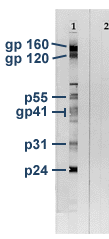Indeterminate HIV tests: when test results are unclear
 This factsheet is about what to do if HIV test results are unclear. (Jan 2025)
This factsheet is about what to do if HIV test results are unclear. (Jan 2025)
It is also available as a PDF file.
Taking an HIV test
There are now several different ways to test for HIV.
- Finger-prick or blood samples or saliva.
- Home testing or home sampling or lab testing.
- Antibody (immune response).
- Antigen (viral particles).
- HIV viral load (RNA) or DNA.
These usually produce results that show you are either HIV positive or HIV negative.
Sometimes though the test result might not be clear. This can make testing more stressful, when you just want to know your status.
This leaflet is about test results that are not clear.

Unclear results
An indeterminate test result means it is not yet clear if the result is HIV positive or HIV negative.
Rather than an on/off response, these results are a little bit on and a little bit off.#
Reasons for unclear results
Reasons for unclear results include:
- It might still be too early for your immune system to react to HIV. This is called the window period.
- The test result is just very weak or unclear.
- Recent use of PEP (post-exposure prophylaxis) or PrEP (pre-exposure prophylaxis) might delay the response.
- The test shows responses to one or two parts of HIV rather than the full virus.
- The test might pick up antibodies from another infection. This could be from recently or from years ago. Examples include COVID, CMV, hepatitis B, malaria or TB but often the cause is not known. This is called cross-reactivity.
- The test can also pick up antibodies from a recent vaccine, pregnancy, autoimmune conditions like arthritis or lupus or from chemicals like bilirubin that are made by your body.
- Some people who took part in an HIV vaccine study might show signs of HIV even though they are HIV negative. This is called vaccine-induced seropositivity.
What happens if the HIV test result is unclear?
If a test result is unclear, you will be asked to come back two weeks later to give a new sample.
If new antibodies have developed, this will give a final clear result.
- New antibodies show that the first test was just too early. The new result is now HIV positive.
- No change usually means that other antibodies were the problem. The new result is now HIV negative.
 If needed, further tests and referrals for expert advice can help.
If needed, further tests and referrals for expert advice can help.
- First HIV test (antibody, antibody/antigen)…
- > Test to confirm results (at a lab)…
- > Second HIV test (two weeks later)…
- > HIV viral load and DNA tests…
- > Expert advice on PrEP and further testing…
- > Referral to the IDRIS clinic.
What happens if the result is still unclear?
If the results are still unclear, they are usually reviewed by a virologist.
- This expert might recommend extra tests.
- If needed, a specialist clinic in London can help. It’s called the IDRIS Clinic.
The IDRIS Clinic
The tests run by the IDRIS clinic on new samples include:
- HIV DNA in two labs
- Western blot
- Markers of the immune system (T cells)
HIV DNA testing is less likely to be affected by recent or current use of HIV meds for PrEP or treatment.
Very rarely, in people taking PrEP, repeat tests may need to be done a few weeks after safely stopping PrEP.
Please do NOT stop taking PEP or PrEP unless your doctor asks you to.
These extra antibody and HIV gene tests usually give a definite HIV result.

Indeterminate Retrovirus Infection Service (IDRIS)
The IDRIS clinic is a UK national specialist NHS free service that provides expert advice about what might work best for you.
Your local clinic can link you to IDRIS or you can contact them directly by email.
imperial.idris@nhs.net
This is a safe, free, expert confidential clinic set in an NHS hospital (St Mary’s) in London. The clinic runs once every two months.
imperial.nhs.uk/sexual-health/hiv-care
HIV testing if you are now using PrEP
Some people start PrEP straight after PEP.
Other people continue PrEP even if the HIV test is unclear.
If you are still using PrEP or PEP, please do NOT stop this to test for HIV.
If all the HIV tests are still unclear, please talk to your doctor about the next steps.
Depending on your circumstances and possible risk for HIV, your doctor might want you to continue PrEP or stop for further testing. These cases are very rare.
Stopping PrEP for 1–2 months should be enough time for tests to produce better results. This will involve using alternative ways to protect against HIV when off PrEP.
If all tests are negative, it will be okay to restart PrEP. Routine HIV testing is still recommended on PrEP, and also 1–2 months after PrEP is eventually stopped.
If the tests become positive, then HIV treatment (ART) is recommended. This is usually with one or two daily pills that contain two or three HIV meds.

Elite controllers and ART
Some people test HIV antibody positive but have undetectable HIV (RNA or DNA).
This is because of a very strong immune response that can control HIV without treatment. This is called being an HIV controller (or elite controller). Less than 1 in 100 people (<1%) living with HIV are elite controllers.
HIV guidelines currently recommend ART for everyone including HIV controllers.
However, the evidence for using ART is more limited for this group and some elite controllers choose not to start ART. In this case referral to a specialist clinic like IDRIS will carefully monitor CD4 count and viral load.
Sometimes people who start off controlling HIV see their viral load steadily increase to higher levels over time. This is another reason to start ART.

Last updated: 2 January 2025.

